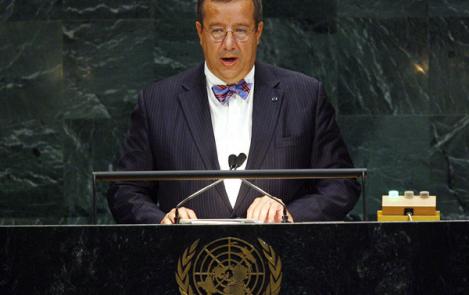-
Reset
+


President of the Republic spoke to the UN General Assembly
Wednesday, 26 September 2007 21:10
Climate change, cybersecurity, crisis regulation, and cooperation between international organizations—these were the topics for the speech by President Toomas Hendrik Ilves in New York, when the Estonian Head of State spoke to the 62nd Session of the United Nations Organization yesterday on behalf of his country.
Climate change has now merited the necessary attention, and has awakened a sense of mission in the world’s countries, said President Ilves.
“Yes, we understand the special needs of the developing countries, when we are speaking about sustainable economic development and eradicating poverty. However, just as important is to disassociate economic growth from energy consumption and carbon dioxide emissions,” said the Estonian Head of State. “The diversification of energy sources and expansion of the utilization of renewable energy is the way of the future. Each one of us should bear part of the collective responsibility for increasing energy efficiency.”
The resources and technology for removing carbons originate primarily from industrial countries, President Ilves stated, adding, “Therefore it is important to continue the dialogue between industrial and developing countries for the introduction of green economics—thereby reducing dependence on carbon-based fuels and striving to counterbalance the climate changes caused by human activities. We must promote the transfer of the technology necessary for the production of environmentally friendly energy. Estonia feels the best way to do this is to tie investments with clean technologies.”
Speaking about cybersecurity, the Estonian Head of State said that cyberattacks are clearly an example of modern asymmetric threats to security, “They make it possible to cripple society with limited means, while being removed from the target. In the future, cyberattacks organized by criminals or terrorists may become much broader and more dangerous weapon than they are today.”
According to President Ilves, in addition to specific technical and legal measures for counteracting cyberattacks, governments must also define the ethics scale of cyberviolence and cybercrimes, which deserve the condemnation of the general public—just like terrorism and trafficking in human beings.
“We call on the international community to cooperate in legal questions related to cybersecurity. Since this entire field is still quite new, it is necessary to create the corresponding legal space. As the first step, we call up all countries to join the Council of Europe Convention on Cybercrime. The Convention is open to signature by those who are not members of the Council of Europe,” said the Estonian Head of State, calling the international cybersecurity program launched in May by the Secretary-General of the International Telecommunications Union (ITU) a very important initiative for international cooperation.
“Estonia also concurs with the assessment of the United Nations Institute for Training and Research that we are sorely in need of internationally ratified and exhaustive cyberspace legislation, and it is the UN that can guarantee the necessary impartial and lawful forum for this work,” said President Ilves.
Speaking about crisis regulation, the Estonian Head of State welcomed the creation of the United Nations-African Union peacekeeping force in order to curb the devastating violence and instability in the Darfur region of Sudan. At the same time, he called upon the UN to be more prominently and effectively represented in Afghanistan, for instance, which would encourage the local residents and would send a signal to international aid organizations and NGOs to increase their efforts.
Speaking about Europe’s crisis hotspots, President Ilves paused on Abkhazia in Georgia.
“We cannot be satisfied with the current situation. It is important to create trust between the parties and to restart meetings between the Georgian government and representatives of Abkhazia. There is no place here for internally or externally based military provocations,” said the Estonian Head of State. “This conflict can be resolved if all the interested parties act constructively. We must create the necessary political will for regulating this crisis, and in this respect, a more effective contribution by the European Union would be welcome.”
President Ilves called for increased coordination from the international community in dealing with the resolution of problems related to forced migration, regardless of whether poverty, armed conflict or natural catastrophes is the reason for the massive migration from home.
“A forced migration from home is always a tragedy. I know. My family was forced to leave their homeland by Soviet occupation forces. Blending into a new society is also a difficult experience. Only with well-coordinated, common efforts can we guarantee that people will never have to leave their homes because they have no choice. Therefore, a global approach to people’s migration should continue to be included as a question of vital importance in the UN agenda,” said the Estonian Head of State.
President Ilves’s speech at the UN is available at www.president.ee
video: http://www.un.org/webcast
Office of the President
Public Relations Department
Phone +372 631 6229



